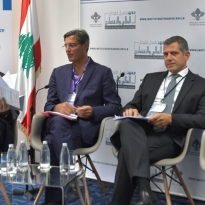Under the patronage and in the presence of H.E. the Minister of Finance, Mr. Ali Hassan Khalil, the Institut des Finances Basil Fuleihan organized the Forum on “Public Procurement for Resilience and Sustainable Growth” in Beirut.
The Forum paved the way for a national dialogue on current challenges, policy options and instruments that would raise public procurement in Lebanon to a more strategic level and allow it to be a powerful lever for competitiveness, private sector development, transparency, trust and confidence-building as well as the improvement of public financial management, infrastructure governance and oversight.
Related Information
Public procurement is one of the critical structural reforms the Government of Lebanon has committed to, at the recent CEDRE conference, to improve financial governance, on the occasion of which the donor community pledge USD 11 billion to support the Lebanese Government implement its Vision for Stabilization, Growth and Employment.
In this context, the reform of public procurement systems and procedures comes as a “goldmine” able to ensure better value for taxpayers’ money, enhance competitiveness, fight corruption and collusion, improve the business climate, enhance institutional confidence, tackle pressing issues related to the environment, etc.
Achieving the Sustainable Development Goals 12 and 16 of the 2030 Agenda for Sustainable Development – with “Ensuring sustainable consumption and production patterns” and with “Peace, Justice and Strong Institutions”, is also linked to bold steps by governments around the world to reform public procurement.
In Lebanon, the modernization of procurement is faced with a number of challenges mainly related to (i) procurement being looked at as an administrative rather than strategic function of the state, (ii) arbitrary practices in the absence of standardized bidding documents and (iii) the absence of job descriptions and competencies framework for the procurement profession.
In this forum, 311 participants were present; 169 from the public sector in Lebanon and 16 from foreign countries, 55 from the private sector, 9 from the civil society, 30 academics and 32 representatives of regional and international organizations.




























































































